Batman Begins (2005, Dir. Christopher Nolan)
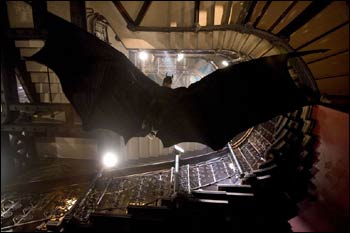
Batman has always been the most saturnine of superheroes — no ordinary Joe bestowed with extraordinary powers, like the Marvel heroes who have dominated our screens recently, Bruce Wayne and his caped crusader alter ego have never asked for our approval, nor appealed to the common geek in all of us. Rather, he has always been at a remove, remote and lone, rich beyond our wildest dreams, cynical about the infinite fallibility of humankind even as he sets out to reedem it. The impenetrability of his motives, even when draped in Freudian motifs of caves and murdered parents, means that directors can have a field day twisting and distorting him to fit their own artistic and thematic ends. What other superhero could have withstood the charming but dated serials of the 40s, the glorious camp of the 60s TV show, Tim Burton’s Gothic carnivals (1989’s Batman and Batman Returns), or especially the homo-psychotic bombast of Joel Schumacher, who almost ended the comic book film genre single-handedly with Batman Forever and Batman and Robin?
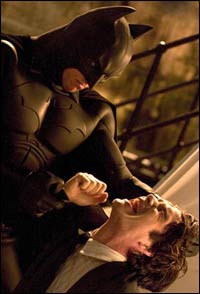
So here comes a new, sober Batman for a new, sober millenium, and fittingly enough, the director is Christopher Nolan, who has made isolated, dislocated characters his stock-in-trade (see Memento and Insomnia). This is a fat-free version of the Batman origin story, skittering from childhood flashbacks to rough-and-ready training scenes in the Himalayas to night-drenched standoffs with mobsters and psychopaths, to the inevitable roar of the Batmobile’s engines and a final face-off on an out-of-control train.
Does it succeed? Mostly. Certainly this Batman has a gravitas that the other big-screen versions lack. Nolan and co-writer David Goyer take pains to ground this Batman in something resembling reality, right down to how the winged one obtains all his wonderful toys (it turns out that Mr. Easy Reader himself, Morgan Freeman, is the Merlin behind the scenes). Most daringly, the movie is focused squarely on Bruce Wayne, his moral and spiritual development, and the back story that leads him to Bat-dom. Thanks to Thomas Newton Howard’s brooding, surging score (with an assist by Hans Zimmer), intelligent acting all around, and Nolan’s understated approach, the movie holds our interest.
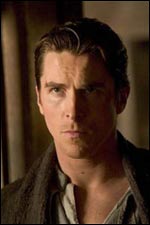
Christian Bale will likely garner a fair share of criticism for his performance, which seems to be nothing more than Patrick Bateman’s leer butted against his Equilibrium sneer, but his interpretation of Bruce Wayne gains in stature as the movie progresses. Physically, he’s the most imposing Batman to date, but he scores his best points by revealing, crack by crack, the madness behind the man’s methods. You can almost buy him in his various poses as millionaire playboy, or thoughtful crusader against crime — and then innocent joy or sadness crosses his face like a cloudburst, or he unleashes rumbling bass thunder in his voice as Batman. The script keeps a fairly tight rein on Bale — for all the travails his character experiences, he is not fully put to the test emotionally — but his turn hints at wondrous potentials waiting to be mined.
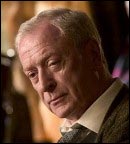 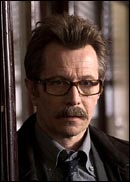
|
He is also ably abetted and humanized by a supporting cast that gets to dig into their characters more than would be expected in films of this ilk. Michael Caine is the clear winner as Alfred, mixing British Army sergeant bravado with glimmers of depth that establish what may be the best onscreen Wayne-Alfred relationship yet. As Sergeant (someday to be Commissioner) Gordon, Gary Oldman is the audience surrogate, and with a shambling sincerity and blinking eyes behind thick glasses, he portrays a common man uncommonly well. His tête-à-têtes with Bale are terse yet pregnant with irony — it seems only fitting that the only champions of justice in a messed-up town like Gotham would be a rumpled, slightly nerdy cop and a guy who dresses up as a bat. The evildoers this time out aren’t flamboyant, but they are well represented by Cillian Murphy, who is the one juicy hambone among the cast as the demented Scarecrow (with pleasing results), and Liam Neeson, who oozes command and elegance as Ducard, Wayne’s wayward former master — one can only mourn what he could have done in Star Wars: Episode I with an actual role.
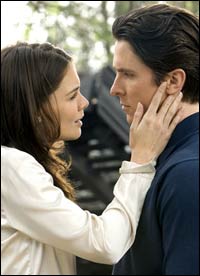 As Wayne’s would-be love interest, Katie Holmes isn’t necessarily convincing as Gotham’s one incorruptible DA, but her appealing girl-next-door quality allows her to skate by, even when the script burdens her with pop-store psychology lines as she attempts to get to the heart of Bruce Wayne (“I heard you were back. But the man I loved, the man who vanished, never came back”).
As Wayne’s would-be love interest, Katie Holmes isn’t necessarily convincing as Gotham’s one incorruptible DA, but her appealing girl-next-door quality allows her to skate by, even when the script burdens her with pop-store psychology lines as she attempts to get to the heart of Bruce Wayne (“I heard you were back. But the man I loved, the man who vanished, never came back”).
It’s dialogue like that which tends to keep Batman Begins prosaic when it should be soaring — I blame most of it on David Goyer, who has never demonstrated much subtlety in his previous writing gigs (Blade, for example). Like FDR, the film’s mantra is that there is nothing to fear but fear itself, and just in case we didn’t get it, nearly every character soliloquizes about it — fear’s paralyzing consequences, “You always fear what you don’t understand,” “You must become fear to conquer fear,” yaddaya yaddaya. Too bad Nolan doesn’t have the visual or emotional dexterity to actually frighten the audience. The film opens with an apocryphal moment, young Bruce Wayne’s first traumatic encounter with bats, and it’s presented as matter-of-factly as an after-school special, rather than as the subjectively terrifying experience it should have been. Likewise, the brain-bending toxin released by the Scarecrow leads to some nifty visual effects, but nothing that will haunt your nightmares. Batman himself provides some jolting moments as he disposes of various goons, but the zest and wit that informs the brutal moments of other superhero movies — think of when Doc Oc is first unleashed in the operating room in Spider-Man 2, or even the Joker’s demise in Tim Burton’s Batman — is nowhere in evidence here.
Perhaps what Batman Begins should truly have feared is the inevitable air of “been there, done that” that now hangs over every big-budget comic book movie. The film echoes key moments from earlier Batmans, especially the Burton version (a flight by night in which the hero drives the disoriented heroine to the Bat-Cave, or the hissed self-introduction by our protagonist: “I’m Batman”), and as it progresses, Wayne’s voyage of self-discovery relents to blurry action scenes and yet another “release poison gas on the city” gambit by the villains, the sense of originality frittered away. One can all but hear the studio suits breathing down Nolan’s neck: “But Chris, baby, where’s the crazy scheme by the bad guys? Where’s the over-the-top car chase? Where’s the cheesy one liners?” Nolan handles these scenes in workmanlike fashion, but one wonders what he could have done if the story had remained rooted to Earth — would Batman’s intelligence and detective skills come to the forefront? Would the emotional stakes be raised? Sadly, I’m not sure if he would have risen to that challenge. He’s at his best when the characters and stakes remain chilly, as with the folding-back-into-himself, memory-addled protagonist of Memento, or the sleep-deprived cop/criminal in Insomnia. It’s just not in him to embrace the hot-blooded, escalating intensity a saga like this requires.
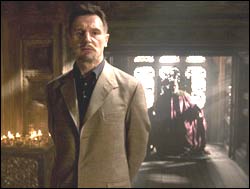 So what we have is a conundrum — a Batman movie with finely tuned performances and an admirable reluctance to indulge in the garish excesses of previous entries, but lacking in the big beats and outsized emotions that elevate the best comics into the realm of pop art. When Liam Neeson intones, “Now if you’ll excuse me, I have a city to destroy,” his delivery is subtle, naturalistic, almost normal — and then you think about the actual lines. If given another chance, Nolan is capable of crafting a sequel that can build on what he’s accomplished here — but as an opening salvo in a reinvented franchise, Batman Begins, like Neeson’s performance, is admirable and intriguing without being wholly engaging.
So what we have is a conundrum — a Batman movie with finely tuned performances and an admirable reluctance to indulge in the garish excesses of previous entries, but lacking in the big beats and outsized emotions that elevate the best comics into the realm of pop art. When Liam Neeson intones, “Now if you’ll excuse me, I have a city to destroy,” his delivery is subtle, naturalistic, almost normal — and then you think about the actual lines. If given another chance, Nolan is capable of crafting a sequel that can build on what he’s accomplished here — but as an opening salvo in a reinvented franchise, Batman Begins, like Neeson’s performance, is admirable and intriguing without being wholly engaging.

Comments
kromangun
Great revue...you should work for the New Yorker, replacing David Denby's dumb-ass. I guess the only thing you either forgot ot neglected to mention was […] Read MoreGreat revue...you should work for the New Yorker, replacing David Denby's dumb-ass. I guess the only thing you either forgot ot neglected to mention was how irritating Liam's beard was...wait...I mean, how irritating the last line of the film was: "And you'll never have to." It should have been, "And I never thanked you," with a confused look on Gordon's face. But seriously, Liam's beard was quite over-the-top. Read Less